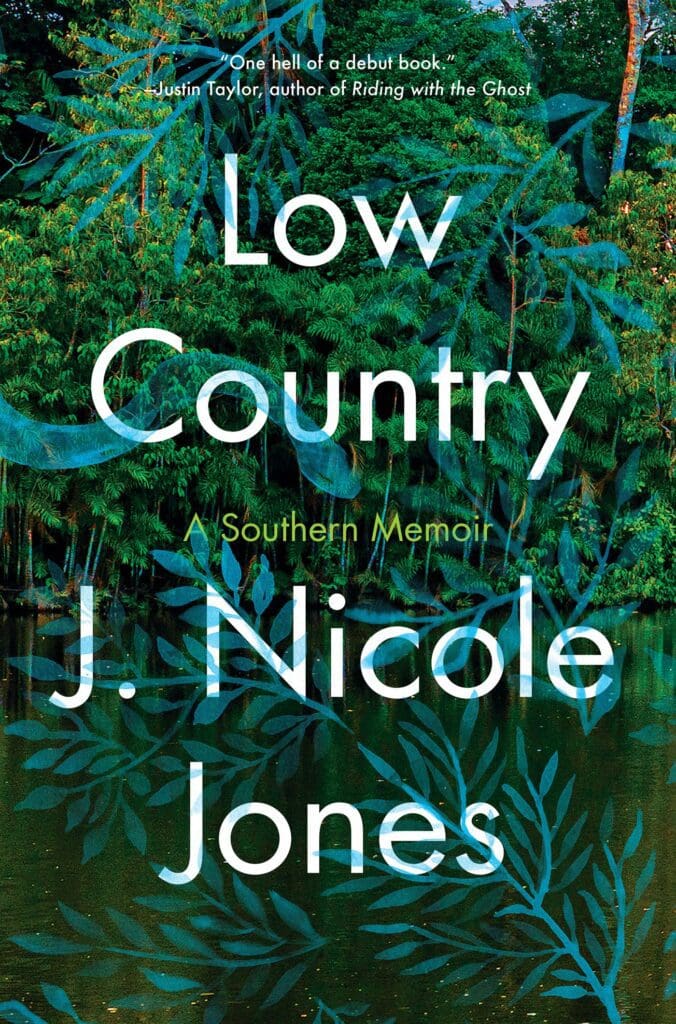In every family there is an archivist. Someone to keep track of lost things, tales of victory and heartbreak, someone who can recall nearly-forgotten names. In author J. Nicole Jones’ family, that person was her grandmother, a woman who could fluidly weave a tale of home—Horry County, South Carolina. With her memoir, Low Country (230 pages; Catapult), Jones has succeeded in the role of family archivist, imploring us to see that the story of the Jones family is the story of South Carolina, and the story of J. Nicole Jones is the story of the women who preceded her. Low Country teaches the ways family is born out of place, and the ways we are born out of each other.
Growing up surrounded by three brothers, an artistic and volatile father, and a grandfather who gave his sons his rage, Jones learned her family’s ghost stories alongside those of the Low Country. Appropriately, Jones begins our entrance into the Low Country with a ghost story: “I watched this figure as she strolled and smiled, a seductive curving form that might pass for the lolling dunes behind us or the sprawl of waves beyond…While I breathe, I hope, says our humble state motto, but surely there is hope for the ghosts of South Carolina too.”
Jones makes us feel intimate with her home in the Low Country through her renderings of great uncles, rejected cousins, and sympathetic grandparents. “Stories, like anger and ghosts, come more alive with every repetition,” she writes. Almost like an elder offering a bedtime story, she wills them to come alive in our dreams: “Let us imagine the captain of this unnamed vessel pulling from his pocket a book of matches designed with an image of Drunken Jack, the smiling, one-eyed pirate, on the back flap.”
Low Country follows the path of its hurricanes: first Hazel, which transformed Myrtle Beach into the travel destination it is now—though this transformation occurred by razing the previously existing beach-side businesses, allowing the Jones family to build an empire of tourist pit stops. Her family created the “fantasy of the beach holiday,” Jones writes. As restaurants and hotels and bars and clubs spread, the Jones barely saw their returns; even then the money was no match for the family’s deep well of medical debt.
Later, there’s Hugo and Bertha, hurricanes less geographically consequential than Hazel but timestamps for different endings. A sold house. A fraught marriage fraying at the edges. But Low Country, for all of its hurricanes (both natural and familial), lost dreams, high rise hotels, and beauty pageants, is not about any of those things.
Low Country is Jones asking if she’ll end up like her grandmother, if she’s made her grandmother proud, and if family is destiny. “She wanted me to know that she had tried to leave,” Jones writes of her grandmother, Nana, the matriarch, victim of a kind of benevolent sexism, denied access to her own personhood. “That she had wanted to. That not everybody gets to move freely in the world. That is what she wanted for me.”
There is not much difference between family histories and the parables of our places, and Jones illustrates the reasons someone would prefer to remember stories as mythologies; the less real people become in our minds, the less material their violence. “I came to understand, from the first time I saw him raise a hand to Nana, that his inner well of fury ran too deep to be contained in just one body, and that the terrifying anger behind his violence was the spring of his other most defining quality, his racism,” Jones writes of her father’s father. There’s no tonal distinction between the way Jones writes about the supernatural Gray Man and how she records her grandfather’s abuses; the stories reveal themselves to be equally real in Jones’ mind, though one is undoubtedly more concrete than the other. Jones seems to understand that mythologizing family doesn’t degrade their histories, but makes them consumable.
Very little of Low Country takes place in New York, though presumably the city is where Jones recontextualized her upbringing and was offered the opportunity to write the book. In some ways, Jones treats New York as an afterlife, or at the very least, a city on the periphery of her story, rather than at the center of things where we so often find it. It’s not the Low Country, South Carolina, or rural life that’s odd, but the need to hide her accented voice or explain to a boyfriend that not everyone graduates from high school or goes to college.
“If only I could reclaim the superstitions and stories passed on to me from fear and remake them as I would see the daughters of the Low Country,” Jones writes. “As free to be, to come and go, as they are to breathe.”
Jones is herself one of the daughters of the Low Country. But unlike those who came before her, Jones chose to leave—and did. If the implied question throughout her memoir is if Jones will end up like her grandmother, telling the stories of men and doing so as a synecdoche for her own, then her departure offers an answer.

